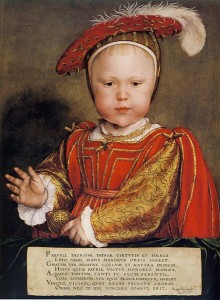 At 2am on Friday 12th October 1537, Queen Jane Seymour gave birth to a healthy baby boy at Hampton Court Palace. The prince who Henry VIII had been waiting for since 1509 was named Edward, probably because he was born on the eve of the feast day of St Edward the Confessor.
At 2am on Friday 12th October 1537, Queen Jane Seymour gave birth to a healthy baby boy at Hampton Court Palace. The prince who Henry VIII had been waiting for since 1509 was named Edward, probably because he was born on the eve of the feast day of St Edward the Confessor.
Church bells around London pealed in celebration, parish churches around the country sang the Te Deum, bonfires were lit, the city merchants gave out fruit and wine, German merchants gave wine and beer to the poor, and the happiest of days was ended by two thousand rounds being fired into the sky from the Tower of London. It was a day of celebration, not only for Henry and Jane, but also for the country.1
Although Jane must have been exhausted by the long and arduous labour (her contractions were said to have started on 9th October), she seemed to be recovering well. Letters announcing the birth were prepared in the Queen’s name and under her signet, and sent to the Privy Council. The Queen wrote:
“Right trusty and well beloved, we greet you well. And forasmuch as, by the inestimable goodness and grace of Almighty God, we be delivered and brought in child-bed of a Prince, conceived in most lawful matrimony between my Lord the King’s majesty, and us; – doubting not, but that for the love and affection you bear unto us, and to the commonwealth of this realm, this knowledge shall be joyous, and glad tidings unto you, we have thought good to certify you of this same: to the intent ye might not only render unto God condign thanks and praise for so great a benefit, but also continually pray for the long continuance and preservation of the same here in this life, to the honour of God, joy and pleasure of my Lord the King and us, and the universal weal, quiet, and tranquillity of this whole realm.
Given under our signet, at my Lord’s manor of Hampton Court, the twelfth day of October.”2
Prince Edward was christened on 15th October at Hampton Court Palace’s Chapel Royal and his mother was well enough to receive visitors. However, by 18th October the Queen was seriously ill and chronicler Charles Wriothesley records that on 19th October there was “a solemne generall procession” at St Paul’s, of the clergy of London, “for the preservation and welfare of the Prince and the health of the Queene.” Unfortunately, Jane got worse. At 8 o’clock in the morning of 24th October 1537, the Queen’s physicians wrote the following letter to the Lord of the Council:
“These shall be to advise your Lordships of the Queen’s estate: Yesterday afternoon she had a natural lax, by reason whereof she began to lighten, and (as it appeared) to amend, and so continued till towards night. All this night she hath been very sick, and doth rather appare than amend. Her confessor hath been with her Grace this morning, and hath done that to his office appertaineth, and is even now preparing to administer to her Grace the sacrament of unction.”3
It is thought that Jane died of puerperal fever, or childbed fever, a bacterial infection which can develop into septicaemia. Henry VIII had a son at last but he had lost his wife.
Prince Edward became King Edward VI on 28th January 1547.
Notes and Sources
- Wriothesley, Charles. A chronicle of England during the reigns of the Tudors, from A.D. 1485 to 1559 (1875 edition), p66-67
- Heylyn, Peter (1600-1662) Ecclesia restaurata; or, The history of the Reformation of the Church of England, Volume I (1849), p14
- Ibid., p15